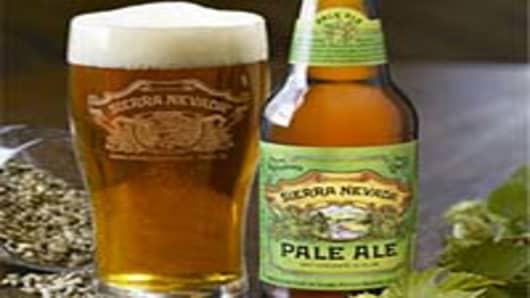What was your first exposure to brewing?
When I was growing up in Southern California I had a neighbor that was actually a rocket scientist, he was an accomplished home brewer and home wine maker. His son and I were best buddies going through elementary school, junior high, and high school. His dad would be brewing something on his stove every weekend and had rows of carboys fermenting away. I was just intrigued by all of that and think it sort of stuck.
What was it like in the early days of building your brewery?
In those days, in the late 70's when I was planning the brewery, there was only a couple of small brewers in the U.S. The whole U.S. brewing industry was down to about 40 independent companies and I had a very small goal of brewing about a thousand barrels a year. Maybe 1,500 barrels a year and our business plan reflected a limited ambition at that point. On paper it looked like we could survive and make a living. It was a struggle the first year or so, and then people started loving our beer and we kept growing and haven't stopped since.
How hard was it to get the ingredients you needed in the beginning?
I drove my '57 Chevy truck down to a malt house that was in San Francisco and would load 2,000 pounds of malted barley on the back. I made a pilgrimage up to Oregon and Yakima, Wash., every year and would buy all my hops, which I still do. I still go up and visit the hop growers and buy all my hops every year. It certainly wasn't the norm for the size we were, they were used to dealing with railcars of malt and I had this old Chevy truck with a hopper in the back.
What was the biggest challenge at the time?
Right now, there's a huge amount of excitement and there's a lot of understanding of craft beer. When we first started, there was a huge educational process we had to do. It was hard to get the retailer to put the beer on the shelf, it was hard to get wholesalers to take you seriously and want to distribute your beer — but that's all changed.
With the move to North Carolina and the continued growth of Sierra Nevada, is there any concern about being perceived as too big? Having it change the way people look at you?
It's something we talk about. Our goal is to stay privately owned and family owned, and have our culture and commitment to the environment and what we do in our brewing methods stay a part of who we are. We still brew the same batch size, we just brew more batches. For us, size isn't really an impediment to being a great craft brewer. It's about philosophy and how you execute it.
How often do people approach you about buying you out?
Almost daily.
Is there a price?
No. Not really. I mean there probably IS a price, but I'm not motivated by the money. I never got into brewing thinking I was going to get rich. It was something I did because I loved beer and I was passionate about the whole process of making it. At this point I don't want for anything. I've got enough money and my family is doing fine, so for us it's part of who we are and it would be tough to turn around and sell it to somebody.
How would you assess the impact of craft beer on the beer industry as a whole?
I think what craft brewing has done for the beer industry is (bring) a lot of innovation, flavor, options, excitement. Now there are lots of new styles or new interpretation on old styles that craft beer has really pushed the boundaries on, and that's brought new drinkers into the market place. I have lots of people tell me 'I hate beer, but I love your beer.'
Of all the beers you brew, which is your personal favorite?
It's sort of like my children. I would never publicly say I have a favorite child, so I'm not going to tell you my favorite beer!
Questions? Comments? Email us at consumernation@cnbc.com. Follow Tom Rotunno on Twitter @tomrotunno.



